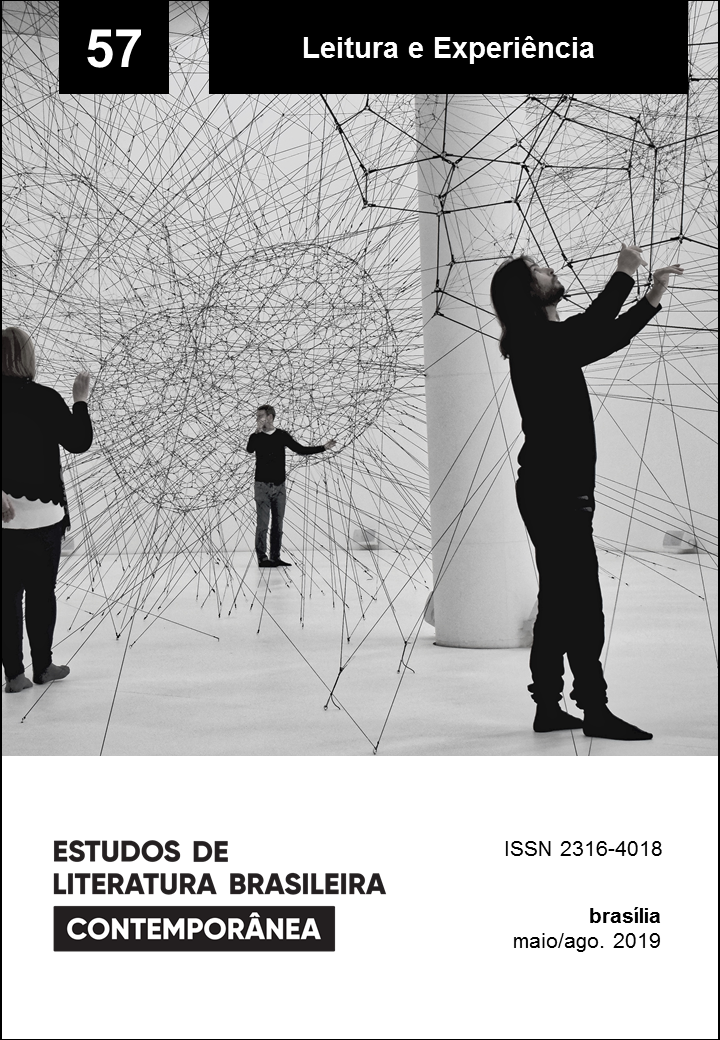Fiction level zero: enunciative un-framing in Delírio de Damasco
DOI:
https://doi.org/10.1590/2316-4018579Keywords:
enunciative unframing, Veronica Stigger, Delírio de Damasco, Barbara SmithAbstract
This paper”Ÿs aim is to reflect upon the reading experience that derives from Delírio de Damasco (2012), from Brazilian author Veronica Stigger. For such a reflection, we raise questions related to the literary enunciation, mainly through the notion of enunciative un-framing, which will be properly developed through our analysis with the support of concepts such as fictive utterance and natural utterance, both conceived by Barbara Smith. We start from the hypothesis that, in this particular work, we have a language without contours, un-framed, mainly because it is a language devoid of the basic elements that inform traditional narrative (narrator, plot, characters). Looking critically at this disturbance in the literary enunciation caused by Delírio de Damasco, we think through how this gesture affects the reader”Ÿs position: how does the noisy transition between the existent and the inexistent take place and what are the consequences of that movement for the continuous stream between real and imaginary.
Downloads
References
AGAMBEN, Giorgio (2013). A comunidade que vem. Belo Horizonte: ed. Autêntica.
AGAMBEN, Giorgio (2007). O autor como gesto. In: AGAMBEN, Giorgio. Profanações. São Paulo: Boitempo.
BARTHES, Roland (2011). A morte do autor. Da obra ao texto. In: BARTHES, Roland. O rumor da língua. São Paulo: Martins Fontes. p. 57-64.
BARTHES, Roland (2011). Da obra ao texto. In: BARTHES, Roland. O rumor da língua. São Paulo: Martins Fontes. p. 65-75.
BARTHES, Roland (1987). O prazer do texto. São Paulo: Perspectiva.
BENVENISTE, Émile (2005). Problemas de linguística geral I. São Paulo: Pontes.
DELEUZE, Gilles (2014). O que é o ato de criação? In: DELEUZE, Gilles. Textos sobre estética. Belo Horizonte: Ed. UFMG.
DELEUZE, Gilles (1998). Lógica do sentido. São Paulo: Perspectiva.
DERRIDA, Jacques (2014). Essa estranha instituição chamada literatura. Belo Horizonte: Ed. UFMG.
FOUCAULT, Michel (2002). O que é um autor? Portugal: Veja/Passagens.
HARPER, Douglas (Org.) (s.d.). Online Etymology Dictionary. [S.l.]. On-line. Disponível em: https://www.etymonline.com/word/danger. Acesso em: 7 jul. 2018.
ISER, Wolfgang (2013). O fictício e o imaginário. Rio de Janeiro: Ed. UERJ.
LIBRANDI, Marília (2014). Escritas de ouvido na literatura brasileira. Literatura e sociedade, São Paulo, v. 2, n. 19, p. 131-148.
LUDMER, Josefina (2013). Aqui América Latina: uma especulação. Belo Horizonte: Ed. UFMG.
NODARI, Alexandre (2017). Quase evento: sobre a estoricidade da experiência literária. Revista eLyra, n. 10, p. 55-77, dez.
PENNA, João Camilo (2010). Veronica Stigger e a arte de dessentir. Blog da Cosac Naify, São Paulo. On-line. Disponível em: https://bit.ly/2HClnn2
SMITH, Barbara Herrnstein (1974). Poetry as fiction. In: SMITH, Barbara Herrnstein. New directions literary history. Baltimore: Johns Hopkins University Press.
STIGGER, Veronica (2012). Delírio de Damasco. Florianópolis: Cultura e Barbárie.
STIGGER, Veronica (2013). Pré-histórias: uma arqueologia poética do presente. Z Cultural, Rio de Janeiro, ano 8, n. 3. Disponível em: <http://revistazcultural.pacc.ufrj.br/pre-historias-uma-arqueologia-poetica-do-presente-de-veronica-stigger/>. Acesso em: 30 jun. 2018.
LEVI-STRAUSS, Claude (2011). Introdução à obra de Marcel Mauss In: LEVI-STRAUSS, Claude. Sociologia e antropologia. São Paulo: Cosac Naify.
Published
How to Cite
Issue
Section
License
Authors who publish in this journal agree to the following terms:
a) The authors maintain the copyright and grant the journal the right of first publication, the work being simultaneously licensed under the Creative Commons Attribution License-Non Commercial 4.0 which allows the sharing of the work with acknowledgment of the authorship of the work and publication this journal.
b) Authors are authorized to enter into additional contracts separately, for non-exclusive distribution of the version of the work published in this journal (eg publish in institutional repository or as a book chapter), with authorship recognition and publication in this journal.
c) Authors are allowed and encouraged to publish and distribute their work online (eg in institutional repositories or on their personal page) after the editorial process, as this can generate productive changes, as well as increase the impact and citation of published work (See The Effect of Free Access).
d) The authors of the approved works authorize the magazine to, after publication, transfer its content for reproduction in content crawlers, virtual libraries and the like.
e) The authors assume that the texts submitted to the publication are of their original creation, being fully responsible for their content in the event of possible opposition by third parties.


